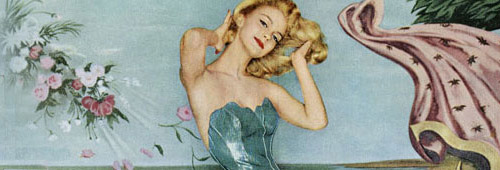High Culture/Low Culture
ADText: Advertising Curriculum
Unit 4: High Culture/Low Culture
Advertising in Literature, Art, Film, and Popular Culture

This unit examines the relation of high culture (fine art, classical music, great literature) to popular culture (blockbuster movies, rock concerts, comic books, and advertisements). To many people, they seem worlds apart. A more careful examination shows that literature, art, and film are intimately linked to advertising. And on at least one occasion each year—Super Bowl Sunday, advertising is elevated to the status of popular cultural spectacle to rival almost every other form of expressive culture.
1. Literature and Advertising
Scholars and literary critics differ over what constitutes literature. The once revered canon of texts (such as The Canterbury Tales, The Merchant of Venice, and Wuthering Heights) has given way to the study of a much broader range of texts (including popular romances, soap operas, and advertisements) and voices (especially kinds of voices that had not been included among canonical texts such as African-, Asian-, and Latin-American writers). Some definitions of literature specify criteria that a text must have in order to qualify as literature whereas others emphasize acceptance by a reading community as the primary marker. The following two definitions of literature represent these differing approaches:
In antiquity and in the Renaissance, literature or letters were understood to include all writing of quality with any pretense to permanence.[focuses on textual criteria]
… literature is a canon which consists of those works in language by which a community defines itself throughout the course of its history. It includes works primarily artistic and also those whose aesthetic qualities are only secondary. The self-defining activity of the community is conducted in the light of the works, as its members have come to read them (or concretize them). [focuses on community acceptance]
Whether one of these or yet another definition of literature is preferred, there is a widely shared sense that literature stands apart from more ordinary texts such as telephone books, shopping lists, operating instructions, and advertisements.






